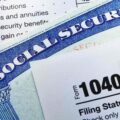Social Security taxes are imposed on all employers who must file an annual return for Social Security taxes. In addition to the social security tax, other fees may be assessed for withholding, filing, and payment. You will want to know how to avoid these fees.
The U.S. Social Security Administration (SSA) recently issued new rules requiring employers to withhold social security taxes (FICA) on employee wages. In 2010, the U.S. Supreme Court ruled that the SSA had the authority to collect FICA taxes on wages earned by workers. This decision came after years of back-and-forth litigation between the SSA and taxpayers.
The rules issued by the SSA regarding the FICA taxes are very complex, and there are several situations where this tax can be withheld. In this post, we will discuss the new rules and explain how to ensure you are not paying this tax on wages earned by your employees. Social Security taxes are one of the primary reasons why employers deduct income from employees’ paychecks. Your take-home paycheck may be lower than expected if your employer doesn’t withhold enough Social Security taxes. The result? You have less money to spend on groceries or other essentials.
Social Security tax employer
Small businesses often overlook this fee because they are already paying payroll taxes, but it is important to understand that they can be subject to additional penalties.
However, the IRS updated this rule in 1996, making it applicable to all employers.
An employer must pay wages subject to FICA taxes to be subject to the social security tax. In other words, annual wages paid to an employee over $400 are subject to the social security tax.
However, employers are not required to withhold and remit FICA taxes on all wages paid.
Employers can file quarterly or semi-annual returns for Social Security and Medicare taxes.
The employer is responsible for paying any penalties for failing to file. In addition, they must pay the interest associated with late filings.
If an employer pays wages over $400, they are subject to the social security tax.
What can be done about this
While there is no “legal” way to avoid the social security tax, there are ways to reduce the tax burden.
One of the best strategies is to reduce your payroll costs. If you are a sole proprietor, you may be able to file an SSA Form SS-8, Application for Determination of Worker Status.
The SSA is the agency that issues Forms W-4 and W-9 for the federal government, so you may be able to obtain a copy of your current form.
To determine if you are eligible for a form SS-8, follow these steps:
- Finally, you can download a copy of your Form SS-8 by clicking on the “Print” button.
- Enter your business name in the Business Name box and click “Continue.”
- Click on “Apply for Worker Status.”
- You must provide the IRS with information regarding your business, including the name and number of employees.
- Once you receive a response from the IRS, you can complete Form SS-8.
How to get a Social Security tax refund
Although the social security tax is an employee’s responsibility, you can apply for a refund.
You can file a return and request a refund through the IRS’s Electronic Filing System (E-File) at efile.irs.gov.
It’s important to note that if you are self-employed, you are subject to the employer’s share of Social Security taxes. However, you can still file a return and get a refund for the employer’s share of Social Security taxes.
If you are self-employed, you can also file a Form 941 and ask for a refund of the employer’s share of the Social Security taxes.
The best way to get a refund is to file Form 941 and include all your wages. You must provide proof of the wages you earned to get a refund.
A simple way to prove your earnings is to log your daily activities. Write down what you did and how long you spent on it. You can also keep receipts of purchases that you made during the week.
If you don’t have any proof of your earnings, you can submit an affidavit, which you can get from a lawyer or another professional.
Can the government force you to pay taxes?
It sounds like a simple question, but unfortunately, there are some complex answers. The answer is “no” if you are a U.S. citizen and “yes” if you are not.
You are probably asking yourself why the IRS can force you to pay taxes but not require you to pay a fine or go to jail. The answer is that the IRS has no jurisdiction outside the United States.
So, the IRS has no authority over you if you are a U.S. citizen living in the U.S. If you are a non-resident of the U.S., the IRS has jurisdiction over you.
However, the IRS has no authority over the companies you work for. Although it is obligated to collect taxes, it is not authorized to fine you or jail you.
Q: How does social security affect me?
A: Social Security taxes are taken from your paycheck before betheygareeposited into your account. This can vary from 0% to 3%. This tax is taken out of your paycheck because it is part of a contribution to your retirement benefits.
Q: How is this tax calculated?
A: The Social Security Administration calculates the tax each year based on your income and the number of dependents. For example, if you earn $50,000 in taxable income with two children, the amount you will pay equals 6.2% of $50,000 (the taxable income). This is split between your employer and employee for social security purposes.
Q: Is it possible to pay Social Security tax to a different company than my employer, or should I report my wages on a W-2?
A: The employer reports the wages paid to you. If you want to spend a different company for social security tax, you must register the taxes you paid to your own IRS. We will briefly meet before the call on Thursday morning to review.
- The social security tax applies to all employers regardless of size or location.
- All employees have to pay the social security tax on their income.
- All employers must contribute the same amount of social security.
Conclusion
So, you will be hit with an additional 2.2% tax on your earnings.
The good news is that you can get credit for having self-employment income.
However, you can also claim it on your federal taxes, so you may only have to pay the tax on the first $132,900.
Depending on whether your employer has been withholding tax from you, there’s a way to offset it.
If they haven’t, then you can claim it back. Otherwise, you’re SOL.













